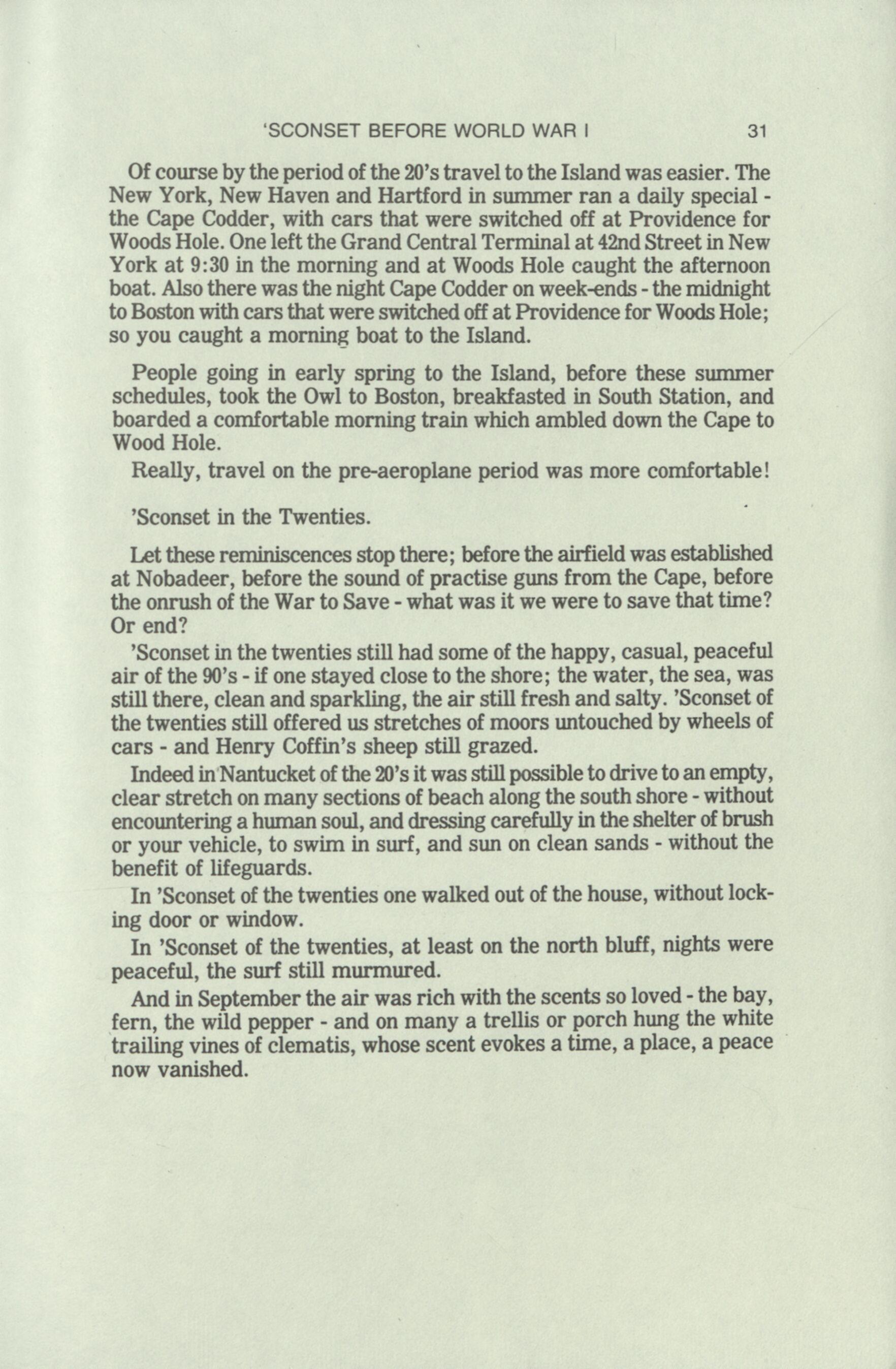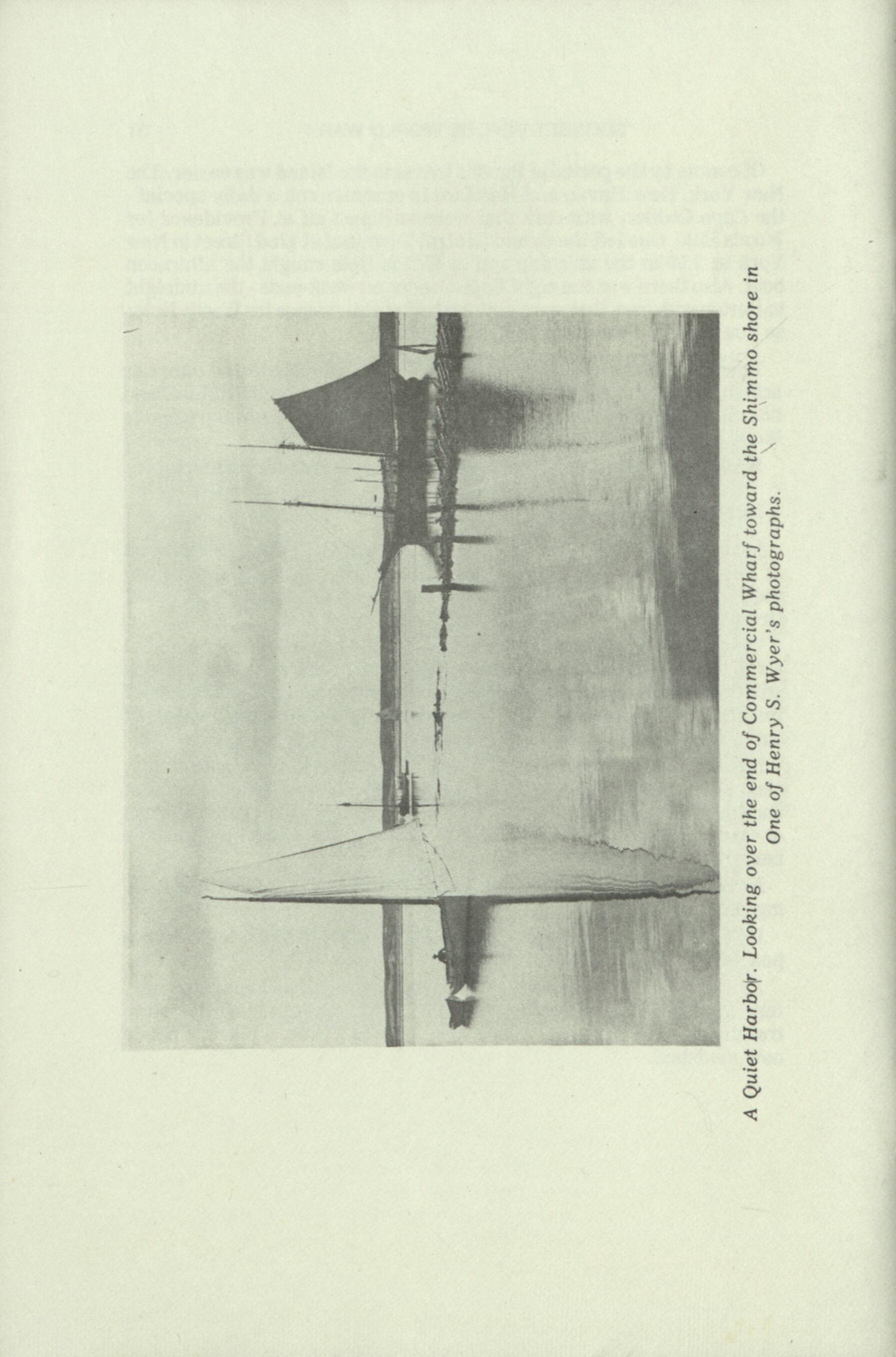
9 minute read
By Miss Alice Beer
'Sconset Before World War I Was A Special Place.
By Miss Alice Beer
JUST BEFORE HER PASSING, Miss Alice Beer wrote me some of her reminiscences of Old 'Sconset, and among these papers was the following graphic and nostalgic account. It was typical of Miss Beer's recollections, and many of our readers will enjoy her look back to yester-year.
"In those years just before World War I the village of 'Sconset was more active socially. There were tennis matches with Town - for the Casino courts were popular. And there were good players from the Yacht Club in Town and we thought dazzling players among our young men. Snap shots show many of my friends in neat white skirts to the ankle and sailor blouses. Sunbonnets were fashionable for girls at that time and turn up in old photographs.
It was in those pre-war years that a 'Sconset institution was founded. Miss Agnes Everett, a singer and actress, a lovable woman and great favorite, was inspired to take two ancient little houses, across the road from the Casino, attach them, decorate them, and open what in those days was called a "tea room". She called it The Chanticleer.
I do not recall that at first anything elaborate in the way of food was attempted. Tea was served, and let me advise you that ladies and gentlemen and boys and girls in those far off days really drank tea, particularly if accompanied by delightful sandwiches and cakes. Probably Agnes served light lunches. But the important point is The Chanticleer was a success and continued to be so. One thing Agnes introduced was the ice cream cone. I have a clear memory of going there on a fine summer morning with my brother Tom and buying cones which we ate strolling along toward Pump Square. I guess this to be about 1908, for I have read a letter of that same brother in his first year at Yale, describing his first experience with that now so common and publicly absorbed delicacy.
Of course the "Chanti" was handy to run over to from the Casino porch at an evening dance. And it soon became an institution.
So the years rolled peacefully on - or so they seem in retrospect - until 1914.
We were still the happy, faraway land; still we barred the automobile. Still we read by lamp light in 'Sconset though certainly there were electric plants in a few homes and householders in Town had gas; hotels electricity.
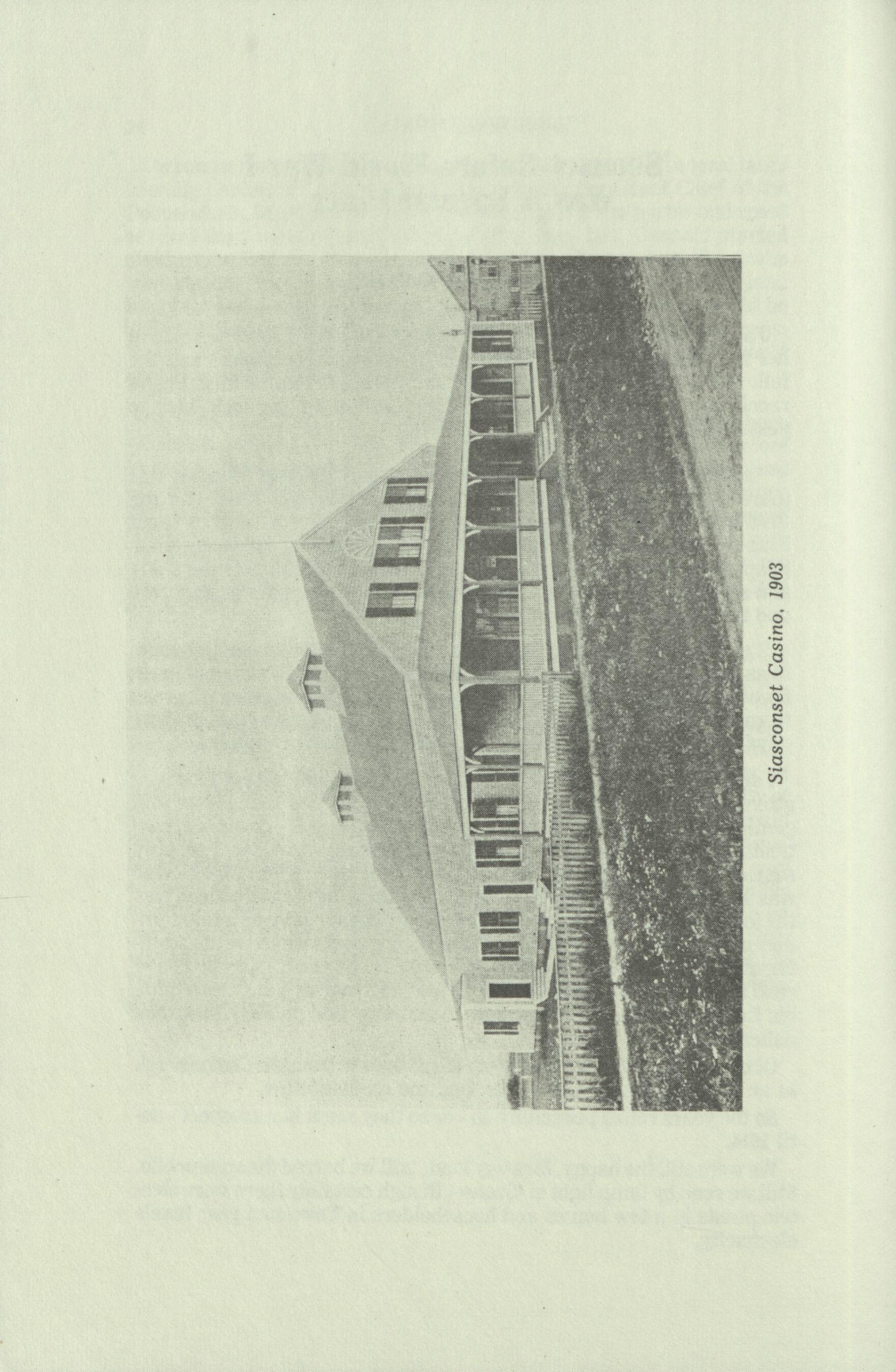
'SCONSET BEFORE WORLD WAR I 27
It is difficult to recall 'Sconset in those years between 1914 and 1917. One's memory focuses on the agitation in the cities, Washington, the War. But in October of 1916 my father died in our summer home in 'Sconset. In May of 1917 my brother Tom had enlisted and was soon in camp in Texas near San Antonio.
Such changes in families were the experience of the War.
The little yellow train that had served Nantucket so well was no more. There was a rumor the "rolling stock" had been sent to France. Difficult experiments in transportation had been made, none very successful. In 1917 a petition was circulated among property holders, to drop the ban on the automobile. It was argued that the townspeople were suffering hardships; it was difficult to get patients from 'Sconset to the hospital in Town, at times.
So -
Pandora's box was opened.
When, after the war, we began to come back to the island, we found the cottages creeping up the north bluff toward the light. Houses were springing up on the west side of our lane - Baxter Road. Houses were appearing on the rising land at the back of the village.
And while the cars were now common, they were not as yet the infliction they are today. But to my dismay I found that the Town Fathers had allowed Broadway in 'Sconset to be the main road north for incoming vehicles. So farewell grass walks, and peaceful little streets. And the Sightseeing busses were plying their trade and romanticizing parts of the innocent village as "the Actors Colony".
What a pity! If they had looked ahead they might have planned a main entrance through a road constructed back of the village to connect with Atlantic Avenue. The ancient village of 'Sconset with the rare examples of architecture might have been saved for walkers and lovers of the antique. But few communities in our country have had the foresight to prevent desolating changes wrought by the increasing power of the gas engine!
One afternoon I was loafing alone on the verandah of our house when Margaret Fawcett raced up the path and to the steps calling "Alice, Alice come look - bulldozers are tearing down all the brush on our Sunset Hill - They are rolling up the moors - how can we stop them?"
It was true. There they were. It was the beginning of preparation for the new golf links. There was no stopping this change.
Soon a handsome big club house crowned the highest hill - across from Sankaty Light - and the 18 hole course spread away along the Polpis Road. It was soon popular, with Nantucket golfers as well as 'Sconseters.
But it seemed to me from that time on the rush to build on the north bluff increased. Houses appeared on Baxter Lane. Front lots were sought and filled, the open fields disappeared.
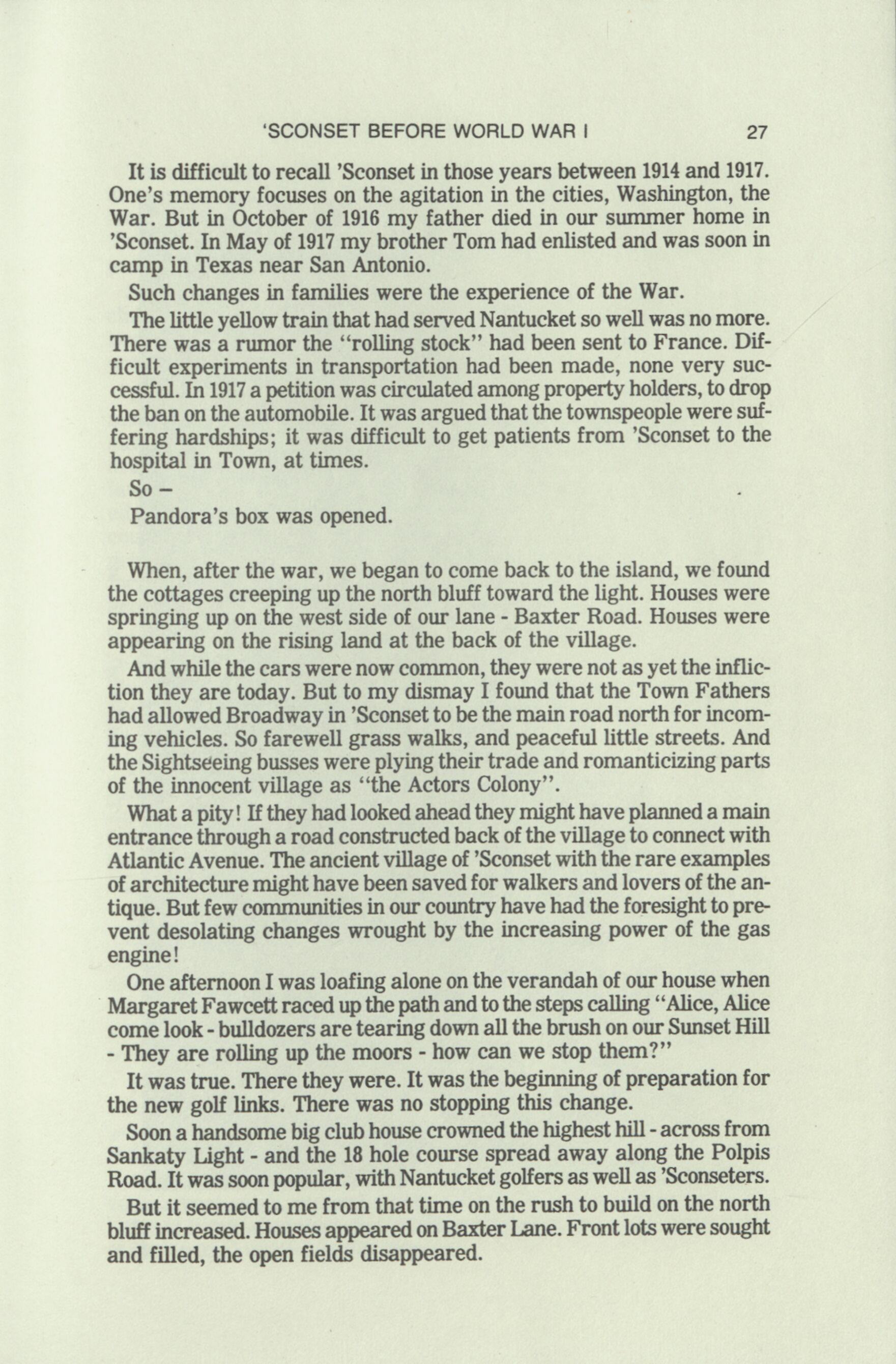

'SCONSET BEFORE WORLD WAR I 29
The casual informality of life was disappearing too. With the car came more contact with Town. The little old meat market of Mr. Burgess had long since gone. Shops increased in Town and so, shopping there by 'Sconseters. A few Town shops did deliver in 'Sconset. Electricity appeared in some of the 'Sconset houses.
Social life was more organized; "events" at the Casino, or the golf club claimed more attention. Afternoon teas and evening bridge parties, and big private dances at the Casino assumed importance in those pre-war years.
There was one event of national significance that it seemed to be had more impact on 'Sconset life, than perhaps the introduction of the automobile: Prohibition. While I have no clear recollection of much drinking, before World War I, it seemed to me that defiance of the foolish law during and after the war became the fashion. The cocktail assumed importance. Friends from Pennsylvania were popular because they could get "Apple-Jack" - which, if gin was not available, made a good drink. The afternoon cocktail party began to take over as the preferred form of entertainment. And as night follows day, the hip pocket flask and the reckless driver appeared as inevitable phenomena.
In that period during and following World War I the character of life on the whole island changed. There were more people, more houses. In 'Sconset there was first one new hotel, The Beach House, then another, the Moby Dick. The old Ocean View had closed and been remoldelled as a home. Much of the old easy, casual life had gone.
There is no doubt that the discovery of 'Sconset's charms by actors and the settlement among us of several members of that profession had enriched local life in many ways. Their presence had attracted the affiliated arts, writers, critics, musicians. For a short term of years in the twenties a focus of these interests was the Tavern on the Moors, conducted by Fred Howe.
Mr. Howe was a liberal, with acquaintances among writers, lecturers, "intellectuals" and people of the artistic world. He took over a large barn, the property of Charles Pitman, on sloping land toward the west side of 'Sconset, near the moors; at least they were within sight! On the first floor he created a restaurant of sorts. The second he made into a hall where meetings were held, lectures given. Living arrangements were provided nearby.
The institution was a success of a sort and did undoubtedly attract writers and speakers and enlivened the local scene considerably. I have among letters from my brother Tom two written to Ernest Boyd, a New York critic and writer. In one, my brother invites Mr. Boyd to be his guest at the Tavern as the family was that summer temporarily housed in a very small, uncomfortable cottage. In a second very amusing letter to Boyd, after the latter's visit, my brother, Tom, mentions some of the special visitors to the Tavern.

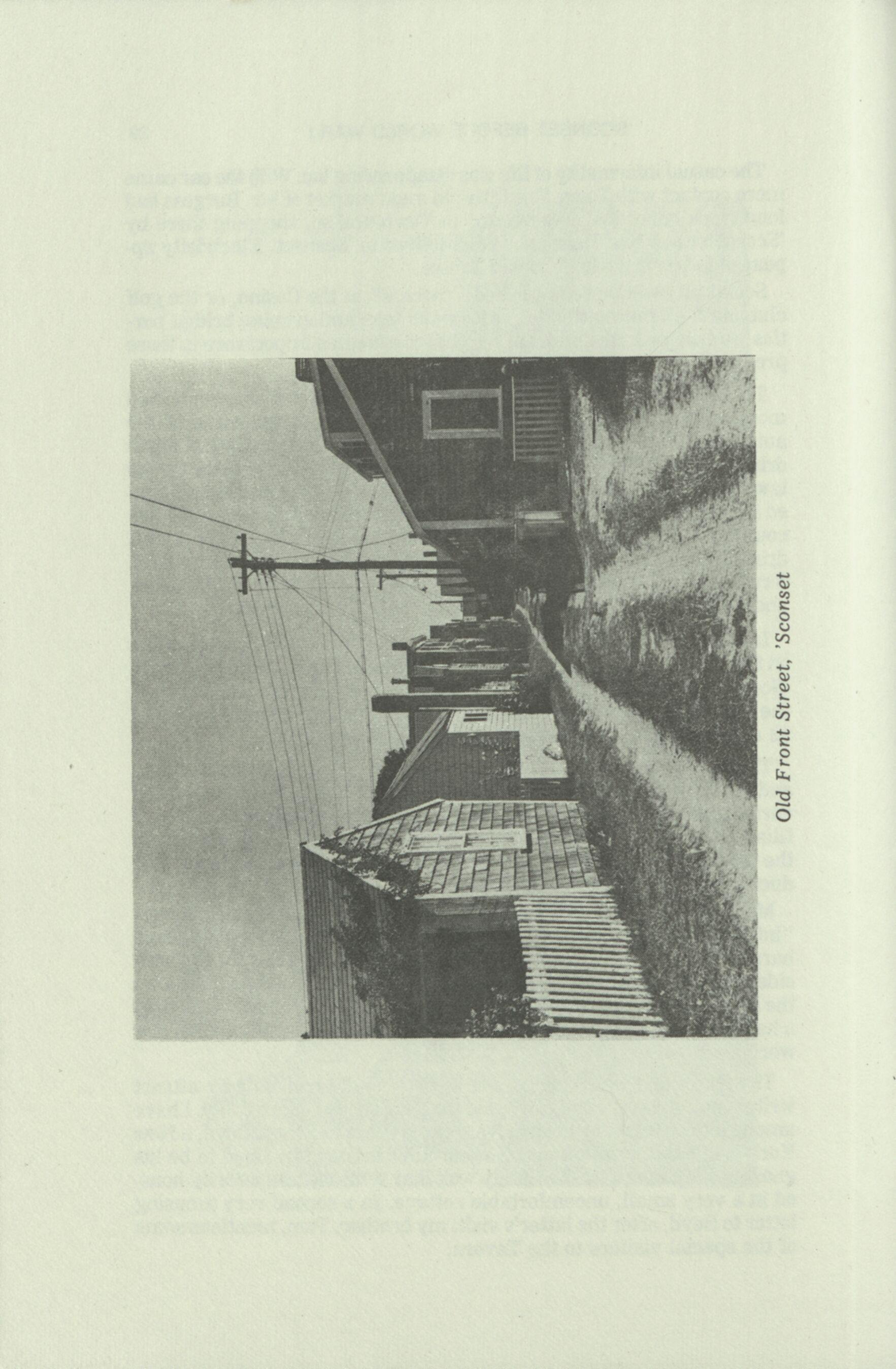
'SCONSET BEFORE WORLD WAR I
31
Of course by the period of the 20's travel to the Island was easier. The New York, New Haven and Hartford in summer ran a daily special the Cape Codder, with cars that were switched off at Providence for Woods Hole. One left the Grand Central Terminal at 42nd Street in New York at 9:30 in the morning and at Woods Hole caught the afternoon boat. Also there was the night Cape Codder on week-ends - the midnight to Boston with cars that were switched off at Providence for Woods Hole; so you caught a morning boat to the Island.
People going in early spring to the Island, before these summer schedules, took the Owl to Boston, breakfasted in South Station, and boarded a comfortable morning train which ambled down the Cape to Wood Hole.
Really, travel on the pre-aeroplane period was more comfortable! 'Sconset in the Twenties.
Let these reminiscences stop there; before the airfield was established at Nobadeer, before the sound of practise guns from the Cape, before the onrush of the War to Save - what was it we were to save that time? Or end? 'Sconset in the twenties still had some of the happy, casual, peaceful air of the 90's - if one stayed close to the shore; the water, the sea, was still there, clean and sparkling, the air still fresh and salty. 'Sconset of the twenties still offered us stretches of moors untouched by wheels of cars - and Henry Coffin's sheep still grazed.
Indeed in Nantucket of the 20's it was still possible to drive to an empty, clear stretch on many sections of beach along the south shore - without encountering a human soul, and dressing carefully in the shelter of brush or your vehicle, to swim in surf, and sun on clean sands - without the benefit of lifeguards.
In 'Sconset of the twenties one walked out of the house, without locking door or window.
In 'Sconset of the twenties, at least on the north bluff, nights were peaceful, the surf still murmured.
And in September the air was rich with the scents so loved - the bay, fern, the wild pepper - and on many a trellis or porch hung the white trailing vines of clematis, whose scent evokes a time, a place, a peace now vanished.
